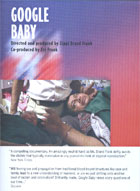
Google Baby 2011, 2009
Distributed by Filmakers Library, 124 East 40th Street, New York, NY 10016; 202-808-4980
Produced by Zipi Brand Frank and Zvi Frank
Directed by Zipi Brand Frank
DVD, color, 76 min.
Sr. High - General Adult
Women’s Studies, Assisted Reproduction
Date Entered: 04/30/2012
Reviewed by Sandy River, Architecture and Humanities Librarian, Texas Tech UniversityThis film explores the globalization of baby-making for those unable to have a child the old-fashioned way. An Israeli man, after obtaining a child through surrogacy in the United States, starts a global business that will broker such transactions to make them more reasonably priced. He ships his Israeli client’s sperm to the U.S. to fertilize eggs obtained from a donor selected from a database of available women. The fertilized embryos are then shipped back to Israel, and the broker takes them to a clinic in India where one or more are implanted in an Indian surrogate. The surrogate lives at the clinic until she is delivered. The broker’s business is the unifying story, but the impact of the film comes from the women who provide essential services: the married American mother of two who sells her eggs to finance the renovation of her house; the Indian women who carry someone else’s child because they want a house or a good education for their children; and the woman doctor who runs a very busy clinic with strict rules on who may be a surrogate and for whom she will try to produce a child. We don’t see the happy moment when the baby is handed over to the client. We do see a few tears from a surrogate when the baby she’s carried is born.
The film offers no commentary, but there is plenty here to fuel classroom discussion. Shopping online for an egg donor seems just like shopping for other goods and services. Seeking out Indian surrogates to save money reminds one of other businesses transferring overseas. Is there something familiar about poor women of color serving better-off Caucasians? There don’t seem to be many regulations standing in the way of the broker’s business plan. Particularly with clients who are supplying neither eggs nor sperm, is this baby buying?
The sound and visual quality of the film are very good given the variety of settings in which filming was done. There are English subtitles for those speaking other languages as well as for those with heavy accents. There are a lot of scene changes but no confusion about where the action is taking place and what is going on. Two newborn babies are shown in clinic scenes, but nothing else should disturb squeamish viewers.
For most viewers, this film offers a look at a business that they will never have thought about or even known existed. It does a very effective job of introducing the participants without making any judgments about what they are doing. In addition to classes in women’s studies, this film could be very useful for those studying bioethics, globalization, and the contrasts in the lives of those in the developed and developing countries.
Awards
- International Emmy Award for News & Documentary, Outstanding Science and Technology Programming, 2011
- Best Film Award, Docaviv International Film Festival